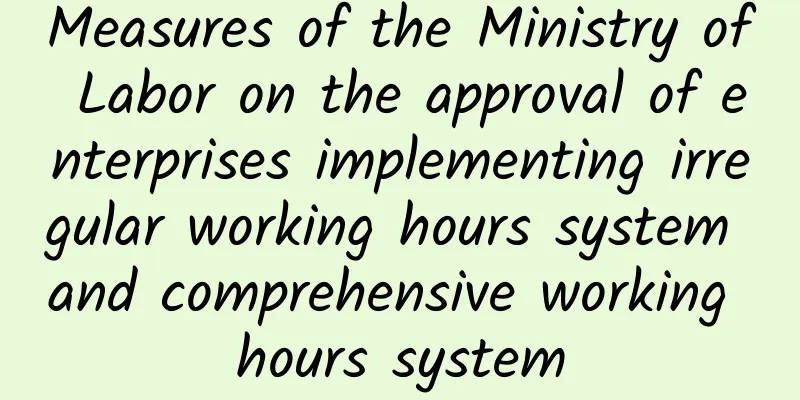Measures of the Ministry of Labor on the approval of enterprises implementing irregular working hours system and comprehensive working hours system

|
Article 1 These Measures are formulated in accordance with the provisions of Article 39 of the Labor Law of the People's Republic of China. The approval procedures for local enterprises to implement irregular working hours, comprehensive working hours calculation system and other work and rest methods shall be formulated by the labor administrative departments of the people's governments of provinces, autonomous regions, and municipalities directly under the Central Government and submitted to the labor administrative department of the State Council for the record. |
<<: EICC factory audit accident investigation and control
>>: Basic requirements of ISO9000 system certification family
Recommend
The most comprehensive guide to applying for "climate-friendly" projects (Part 1)
When searching for a product, when will the scree...
WRAP Certification Professional Glossary
WRAP WRAP is the acronym and registered trademark...
What should I do if my eBay account is restricted? How can I solve it?
Common types of restrictions on eBay include: 1. ...
The national carbon market is expected to gradually expand as it turns one year old
The national carbon emission trading market is ab...
How to correctly handle child labor and historical child labor during factory inspections
How to deal with child labor if it is found durin...
What is Woobox? How much does Woobox cost?
What is Woobox? Woobox is a platform for marketin...
BSCI certified staff interview content
BSCI factory audits fall under the category of soc...
Otto--Germany's second largest e-commerce company
What is Otto? Otto has 9 million registered users...
How can eBay sellers save operating costs?
1. Provide Second Chance Offer This is actually a...
Six serious non-compliance issues in Walmart's social responsibility audit
Six serious non-compliance issues in Walmart'...
Cross-border e-commerce companies settled in Harbin Cross-border E-commerce Comprehensive Pilot Zone, fully promoting the high-quality development of Heilongjiang Province's cross-border e-commerce industry
Up to now, Harbin Comprehensive Bonded Zone has i...
What is Browze? What are the advantages of joining Browze?
What is Browze? Browze is affiliated to Daily Gra...
How is Good Friend International Freight Forwarder? What are the advantages of Good Friend International Freight Forwarder?
How about Good Friends International Freight Forw...
Global recycling standard GRS factory inspection meets various customer requirements
The purpose of the "Global Recycling Standar...
Analysis of eBay's advantages and disadvantages, eBay's practical information!
eBay sellers who want to make money on eBay in 20...









